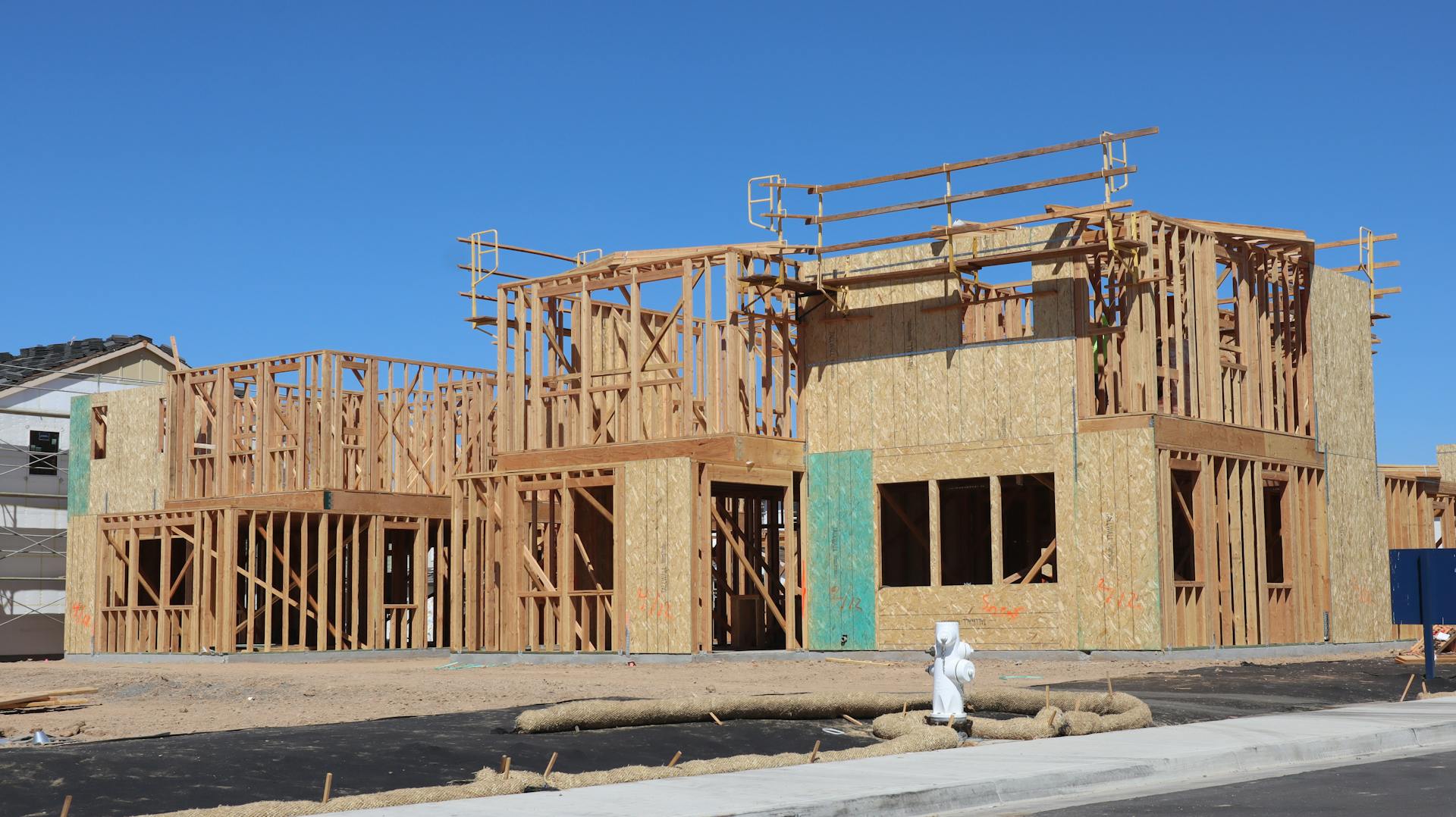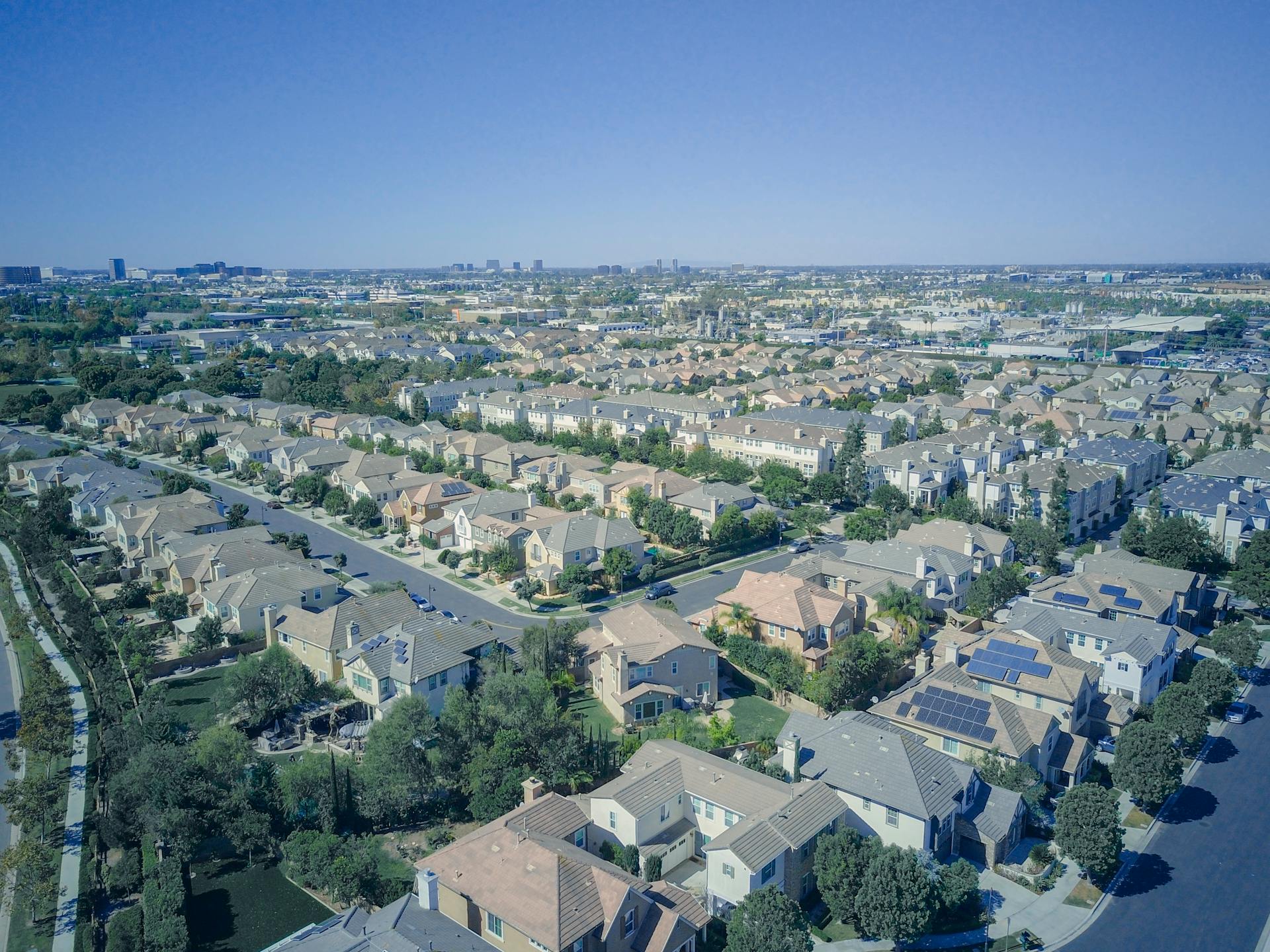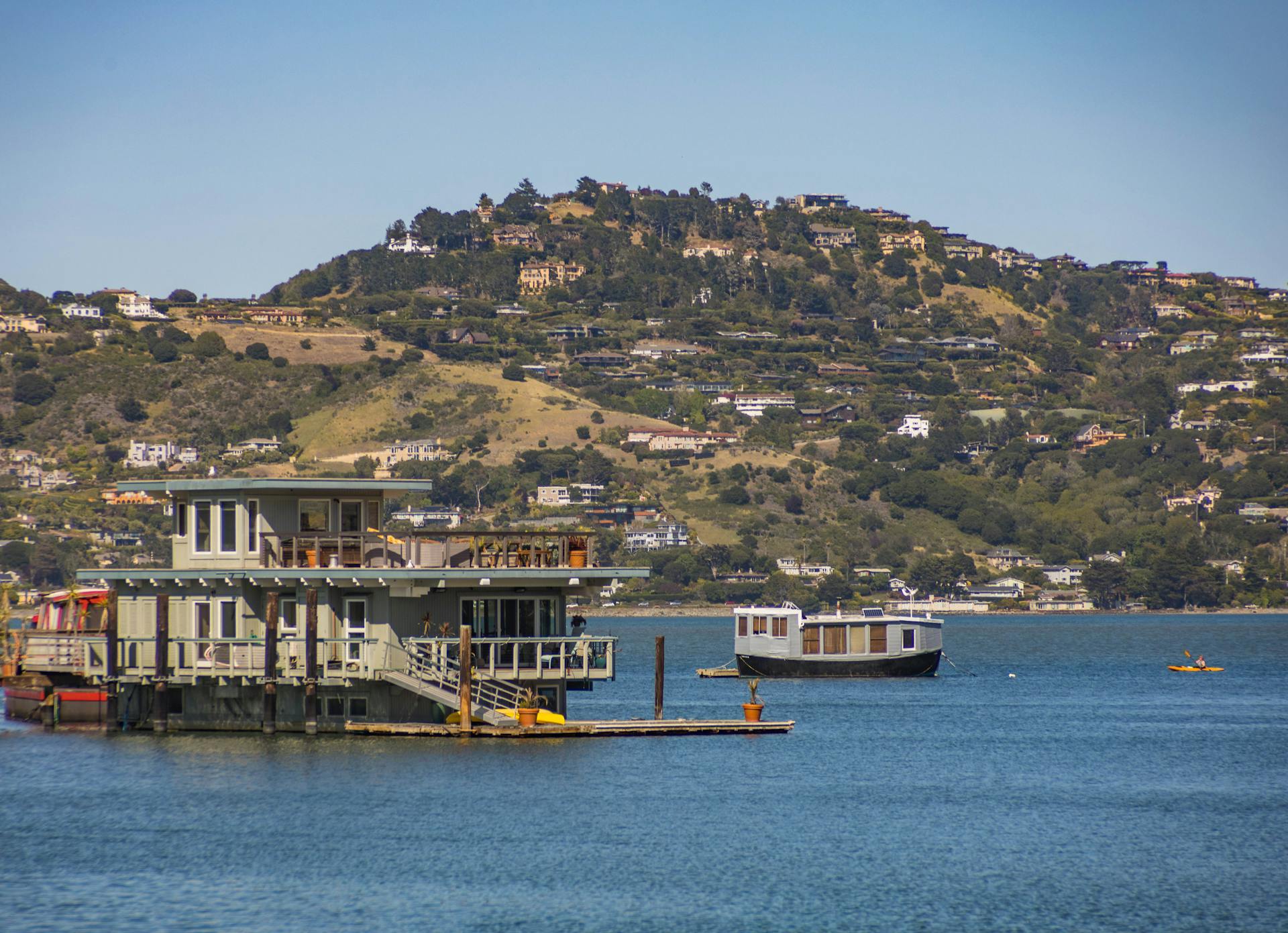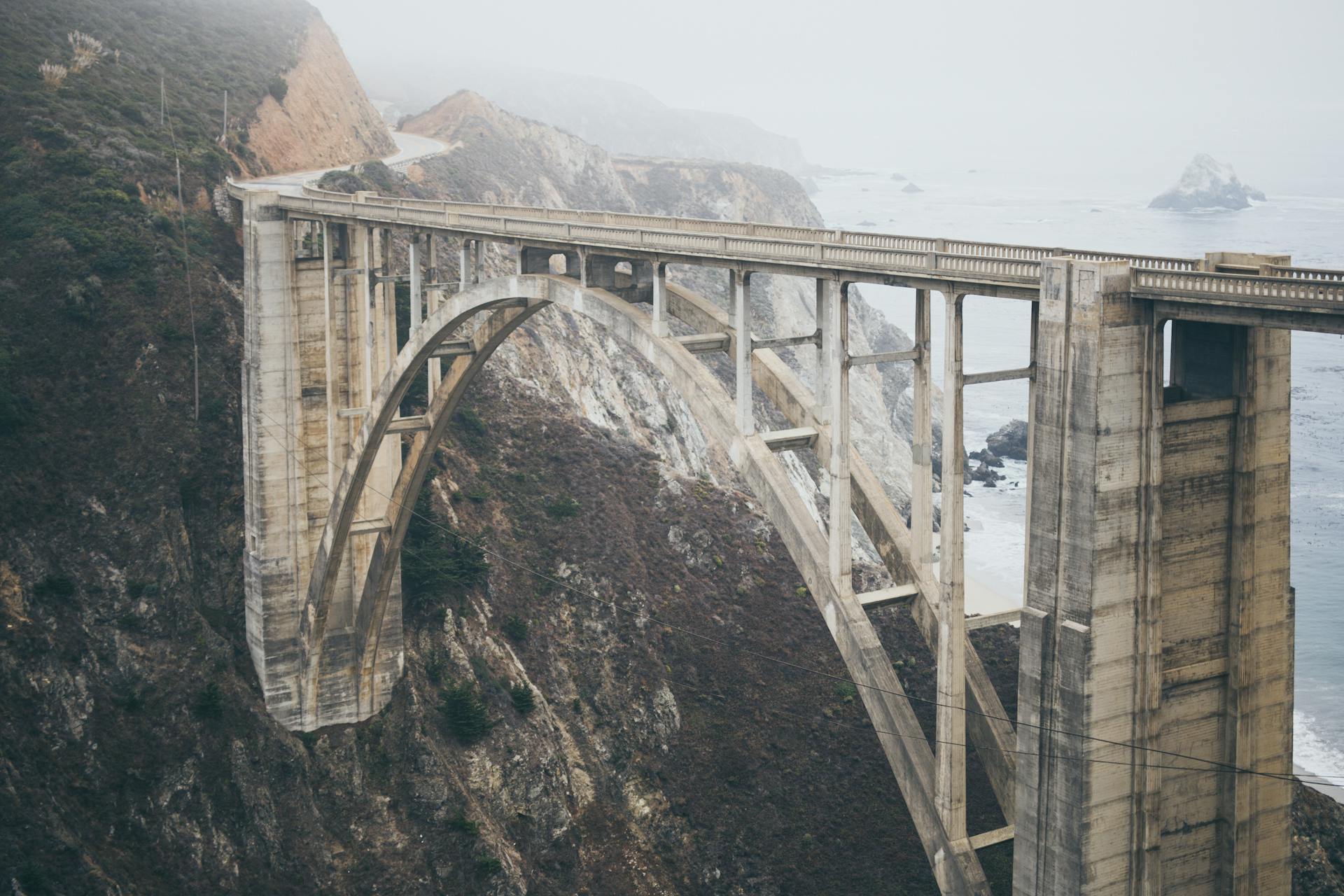
In California, condo owners often face a significant financial burden after an earthquake, with the average repair cost per unit ranging from $20,000 to $100,000.
The cost of repairs can be overwhelming, but understanding the insurance options available can help mitigate the financial impact. California condo earthquake insurance policies can provide financial protection against earthquake damage.
These policies typically require a separate earthquake deductible, which can range from 10% to 20% of the policy's value. This deductible can be a significant expense for condo owners.
Many condo owners may not be aware that their condo association's insurance policy may not cover earthquake damage to individual units. This means that owners may be responsible for paying for repairs out of pocket.
Readers also liked: About Indemnity Health Insurance Policies
What is Covered
Your condo unit's interior, including appliances and valuables, is not covered by your HOA's earthquake insurance policy, which only covers the outside of the building's structures and windows.
You'll be responsible for replacing and repairing damage to the interior of your unit without separate condo unit earthquake insurance.
You can purchase a CEA policy to cover the interior of your unit, appliances, and valuables, even if your condo unit owner policy is not up for renewal.
Contact your home insurance agent to purchase a CEA policy and add earthquake coverage to your condo unit today.
Additional reading: What Does D&o Insurance Not Cover
Policy Details

If you're looking to understand the specifics of your California condo earthquake insurance policy, start by reading your entire policy and its declarations page. This will give you a clear idea of your coverages and how they work.
Your policy will likely outline exclusions and special limits, so be sure to review those carefully. All the terms and conditions of your CEA insurance coverage can be found in the policy itself.
To get a better sense of what's included in your earthquake insurance, take a look at the key types of coverage. Repairs to your house and attached structures are usually covered, but keep in mind that if you're a renter or condo owner, the landlord or condo association is responsible for insuring the building.
Damaged belongings, such as furniture and clothes, are typically covered, but some fragile or valuable items may not be included, like artwork or glassware. Additional living expenses, like hotel and restaurant bills, are also covered if you can't live in your home during repairs.
You might enjoy: Earthquake Insurance
Here are some additional types of coverage you might find in your policy:
- Detached structures, such as a carport or toolshed
- Debris removal
- Emergency repairs to protect your home from further damage
- Building code upgrades to bring your home up to the latest safety standards
- Land restoration to stabilize the property underneath your home
- Loss assessment for condo unit owners, in case your association asks you to contribute to repair costs for shared spaces
Financial Aspects
Purchasing earthquake insurance for your California condo can significantly raise your regular assessments, potentially by more than 20%. This may require a vote from your HOA members (Civil Code Section 5605).
If your HOA decides against insurance and an earthquake strikes, you'll likely be assessed a hefty fee in special assessments to cover rebuilding and repairing damages.
The cost of rebuilding and repairing damages without individual earthquake coverage can be substantial, and it's essential to understand the potential financial impact on your HOA membership.
Check this out: California Insurance Bad Faith Punitive Damages
HOA Financial Impact
Purchasing earthquake insurance for a Homeowners Association (HOA) can have a significant impact on members' finances. If the board decides to invest in insurance, the premium will raise regular assessments.
The board must get a vote from members if the insurance premium increases assessments by more than 20%. This is according to Civil Code Section 5605.
Worth a look: What Are the Best Places to Elope in California?
Without earthquake insurance, the HOA may assess individual homeowner funds to cover rebuilding and repairing damages after an earthquake. This can result in a hefty fee for members.
Specialized policy options are available for areas with specific risk factors. Contact your HOA's insurance provider to learn more about these options.
How Much Do You Need?
If you're a homeowner, your insurer usually sets the same limits on dwelling coverage for both earthquake and home insurance, reflecting the estimated cost to rebuild your home, not its market value.
You can raise your personal property coverage limit to your insurer's maximum, but there may be caps on how much your insurer will pay for certain items, such as computers.
A home inventory can help you determine how much your belongings are worth, and consider how much it might cost for you to spend weeks or months living elsewhere if it took a while to repair your home.
Your personal property coverage limit may initially be set on the low side, around $5,000.
For your interest: Florida Insurance Claim Time Limit
Preparation and Protection

Preparing for an earthquake is crucial in California, where the risk of a major quake is high. Over 15,000 known faults exist in the state, with more than 500 of them active.
To mitigate potential damage and financial hardships, consider taking proactive steps. Purchasing earthquake insurance, for instance, can provide financial protection in case of a quake. This type of insurance is not mandatory in California, but it's essential to note that damage from earthquakes is excluded from standard home insurance policies.
Securing heavy items, storing breakable objects low, and identifying safe spaces are also vital. You can start by securing heavy furniture, appliances, and electronics to walls to prevent them from falling and causing injury. Store breakable objects in low or closed cabinets with latches, and keep heavy objects low to reduce the risk of injury from falling objects.
Here are some essential items to include in an earthquake kit:
- Radio or other device to receive updates
- Non-perishable food and water
- Necessary medications
- Flashlight
- Extra batteries
- First aid kit
Having a disaster kit handy can help you survive for a few days if necessary.
Home Preparation

Securing heavy items is crucial in earthquake-prone areas. This includes furniture, appliances, electronics, hanging objects, and even ceiling fans. Keep tall and heavy objects away from areas where you normally spend time, like your living room couch or dining room table.
You should also store breakable objects low, such as glassware, in low or closed cabinets with latches. This will reduce the risk of injury from falling objects.
Identifying safe spaces and making a plan for shelter is also essential. Identify spaces where you and your family could take cover during an earthquake. The spaces should be away from windows, mirrors, or other heavy objects that could break or fall.
Inspecting your home is a good idea, especially if you live in an earthquake-prone area. You might consider having your home inspected by a professional to assess its earthquake readiness.
To prepare for an earthquake, it's a good idea to have an earthquake kit on hand. The kit should include a radio or other device to receive updates, non-perishable food and water, necessary medications, a flashlight, extra batteries, and a first aid kit.
Here are some items you should consider including in your earthquake kit:
- Radio or other device to receive updates
- Non-perishable food and water
- Necessary medications
- Flashlight
- Extra batteries
- First aid kit
Loss of Use

Loss of Use coverage is a valuable component of earthquake insurance that can help you cover the extra costs of living elsewhere temporarily after a quake.
You may be surprised to learn that Loss of Use coverage doesn't have a deductible or a time limit.
This means that you can get compensation for additional living expenses such as temporary rent, food, moving, and storage costs without any additional fees.
As California residents, we're often told to prepare for "the big one", and with over 15,000 known faults in the state, it's no wonder that earthquake insurance is a smart investment.
Loss of Use coverage can help you cover the costs of living elsewhere while your home is being repaired, which can be a huge relief during a difficult time.
You can choose the limit of your Loss of Use coverage when you purchase earthquake insurance, so it's essential to consider your needs and expenses.
With Loss of Use coverage, you can focus on rebuilding and recovering without worrying about where you'll live or how you'll pay for it.
Discover more: Can I Get Dental Insurance without Health Insurance
Building Code Upgrades

Building code upgrades are a crucial aspect of earthquake preparedness. Older condo units may need to be upgraded with new plumbing, electrical, heating, and air conditioning systems to pass local and state building inspections.
In the aftermath of a devastating earthquake, rebuilding often requires adherence to current building-code standards. This ensures the safety and resilience of the structure.
Damaged units may need to be brought up to code, which can be a costly and time-consuming process.
You might enjoy: Do You Have to Have Renters Insurance for an Apartment
Emergency Repairs
Emergency repairs are a must after an earthquake to protect your condo unit and keep your family safe. Emergency repairs can be needed after an earthquake or aftershocks to prevent damage.
You may need to board up damaged windows to prevent rain damage and broken glass from furniture can be a hazard. Emergency repairs can be costly, so it's essential to have a plan in place.
In some cases, emergency repairs may be needed to remove broken glass from furniture. This can be a time-sensitive issue, so it's crucial to act quickly.
Buying Protection

In California, you can purchase earthquake insurance through the California Earthquake Authority (CEA) or private insurance companies. Over 20 property insurance companies currently sell CEA coverage.
To qualify for CEA insurance, you must have a homeowners insurance policy with one of the participating insurance companies. This is because CEA coverage is not a standalone policy.
A basic individual insurance policy, such as an HO-6 policy, is necessary for obtaining earthquake coverage. Without it, you won't be able to receive earthquake coverage.
The CEA offers four types of earthquake coverage for condominium owners, including Earthquake Building Property, Earthquake Personal Property, Earthquake Loss of Use, and Earthquake Loss Assessment. You're not required to purchase all four types of coverage.
You can check your state's earthquake risk on the USGS website. California and Alaska are the two states with the most frequent earthquakes, according to the USGS.
If you're a homeowner, your insurer usually sets the same limits on dwelling coverage for both earthquake and home insurance. This reflects the estimated cost to rebuild your home, not its market value.
A home inventory can help you determine how much your belongings are worth, which is essential when choosing a coverage amount for your personal property.
Related reading: What Is Not Covered by an Umbrella Policy
Insurance and Costs
The cost of earthquake insurance for California condos can vary depending on several factors, including the age of your home, the number of stories in your building, and the rebuilding cost of your unit.
You can estimate the cost of earthquake insurance for your condo on the CEA's website, which is a good place to start if you're looking to get a sense of what you'll pay for coverage.
The price of earthquake insurance may be different for every homeowner, and it's determined by factors such as the age of your home, the materials it's built with, and the type of foundation it has.
Here are some specific factors that can affect the cost of earthquake insurance:
- The age of your home
- The materials your home is built with
- The type of foundation
- The home’s proximity to a fault line
- Reconstruction costs
- Coverage types
- Deductible amount
If you own an older home that's been retrofitted to withstand earthquake damage, you could qualify for a discount on your CEA insurance.
Loss Assessment
Loss Assessment coverage can help pay your share of certain additional assessments levied by your HOA on its members for earthquake-damage repairs.
These assessments can be for repairs to the exterior of your condo development or certain common areas, such as a building's facade or a shared pool.
Loss Assessment coverage can also help pay a master-earthquake policy deductible, which is a significant cost that can be a major financial burden for homeowners.
Building code upgrades are another expense that Loss Assessment coverage can help with, ensuring that your condo development is safe and compliant with regulations.
Cost
Cost can be a significant factor when considering earthquake insurance. The price of earthquake insurance may be different for every homeowner, depending on various factors.
The age of your home is one factor that can affect the cost of earthquake insurance. If you own an older home, you may be eligible for a discount on your CEA insurance if it meets certain criteria, such as being built before 1980, constructed with wood frames, built on a raised foundation or other non-slab foundation, and seismically retrofitted based on California standards.
Earthquake insurance premiums are generally based on the home itself, rather than the homeowner. The more risk your home faces, the higher your premium may be.
You can estimate the cost of earthquake insurance for your home on CEA's website if you live in California. The average cost of retrofitting a home for earthquake safety is between $3,000 and $7,000, which can help reduce your premium.
Here are some factors that can affect the cost of earthquake insurance:
- The age of your home
- The materials your home is built with
- The type of foundation
- The home's proximity to a fault line
- Reconstruction costs
- Coverage types
- Deductible amount
Choosing a higher deductible can save you money on your premiums, but it could leave you with a hefty amount to cover yourself after an earthquake.
Frequently Asked Questions
Is an Hoa required to have earthquake insurance in California?
In California, an HOA is not required by law to have earthquake insurance, but may be obligated to do so according to its governing documents. Check your HOA's documents to see if earthquake insurance is a requirement.
What is the average cost for earthquake insurance in California?
The average annual cost for earthquake insurance in California is between $1,000 to $2,500 for $500,000 of coverage. Customize your policy to get a quote tailored to your needs.
Is it necessary to have earthquake insurance in California?
No, earthquake insurance is not mandatory in California, but it's highly recommended to protect your home and belongings from earthquake-related damage. If you have a mortgage, you may still want to consider purchasing earthquake insurance to avoid potential financial losses.
Sources
- https://www.earthquakeauthority.com/california-earthquake-insurance-policies/condominium
- https://echo-ca.org/cost-earthquake-insurance-hoas-california/
- https://www.perfectca.com/earthquake-insurance/
- https://www.nerdwallet.com/article/insurance/earthquake-insurance
- https://www.bankrate.com/insurance/homeowners-insurance/california-earthquake-insurance/
Featured Images: pexels.com


